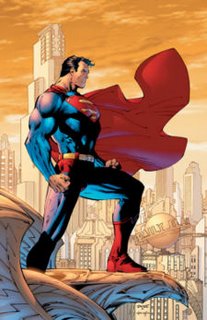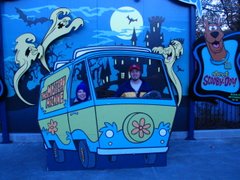
I have been delving into the retcon mythology of Clark Kent and Superman's beginnings through the television show Smallville. So far, I have seen the first four seasons and am awaiting, not so patiently, the fifth to be returned to the local movie store. Superman happens to be my favorite of all superheroes. Sure, this says a lot about my shallow popculture tendancies, but nonetheless, it's true. After this summer's movie, perhaps not the box office success it would have been had Pirates of the Carribean 2 not come out a week after Superman Returns, this childhood love for the spandex wearing superhero was reaffirmed. When I was a kid, I had Superman Underoos and I'm ready to publicly admit it. (Oh, well, there go my chances at a promising political career, shucks!) I would often visualize myself running alongside the car on family vacations, and even dream about helping folks out of jams perhaps winning the affection of some love struck reporter. Alas, I grew up. Now, I watch others act it out on the television, still somewhere deep in my imagination, dreaming of being the righter of wrongs.
However, in thinking so much about it and watching so much of Smallville, I have wondered how Superman et. al. fit into mythology. What purpose does mythology serve? Does it still serve that purpose today? For folks who find themselves in postmodernity? Do we allow ourselves to be moved by mythology?
As a Christian, Wesleyan-Arminian, Open theist, and poet, I have to say that I know we have mythologies (classically speaking of course). We have our creation mythologies (sic), and our flood mythology (sic), and the rest. And they do what mythology has done for folks throughout time. They are an oral, now written, explaination for the world around us. Now, to merely speak of scripture in these terms would be shortsighted as scripture is not about how or what, but rather about who. In this case, God created, etc. For me and those out there like me, though I understand they are few and far between (at least who would admit to it), Scripture is the written revelation of God to his people. These mythologies still define us, help to shape us.
Robert Graves, author of Greek Myths and Legends, wrote, "True myth may be defined as the reduction to narrative shorthand of ritual mime performed on public festivals, and in many cases recorded pictorially." In fact, many myths stem from many cultural needs. Do we have cultural needs as Americans as much stuck in as freed by postmodernity? Then, do we have mythologies and would these mythologies be super heroes?
Jerry Siegal and Joe Shuster created Superman in 1932 while living in Cleveland, Ohio. This was during the Great Depression and there was certainly cultural need for mythology. Of course Action Comics #1 featuring the Kryptonian didn't debut until 1938. This superhero wasn't there to provide a fantastical escape, as some opponents to entertainment would deduce, but rather to inspire hope. While certianly more jingoist now than it would have been at the time, Superman was there to defend "Truth, Justice, and the American way." His positive tone and historically moral opposition to evil constantly sold more and more comic books.
Julia and I have often talked about how different Superman is than other superheroes. There is never the question of whether or not he will do what is right. That just does not seem to be the point. Rather, Superman has come to right the wrongs. The story of how he became Superman is more important than whether or not he will choose good or evil. The question of which came first, Clark Kent, Kal-El, or Superman, is more important a question than whether or not he will choose good or evil. The choice is still there, mind you; Superman still chooses to do good over evil. For other superheroes this is not the case. It is simply not that simple.

So, is Superman a part of our American/Western (not all bad) mythology? Does he inspire hope? There are criticisms of Superman that associate him to Moses or even a Christ figure. And though both allusions are supported, the illustration would fall short.
What remains is that perhaps a boy in his Superman underoos, flying around his house with a blankey cape tied around his neck is inspired to hope. Perhaps a God who loves us so much that he would rather die than live without us is free to use such entertaining mythologies to inspire hope in us.



3 comments:
OH--such memories!! You did have the underoos--BUT you also had that beach towel thingy with the hole in the middle and when you put it over your head it had a Superman cape in the back and the muscle-bound spandex body (appliquéd) on the front. THAT WAS AWESOME---I think it was so manly!!
SIS
You know, I think I still have that somewhere. By the way, faithful readers, it was my sis Marsha who introduced me to the Christopher Reeves as Superman! You have her to thank for all of this.
This is off subject - but I loved what you had to say on Amy Peach's blog - thank you!
I also love that you read Clark Pinnock - Most Moved Mover is my favorite -
Thanks again - you don't know me but I am friends with the Felders :)
Post a Comment